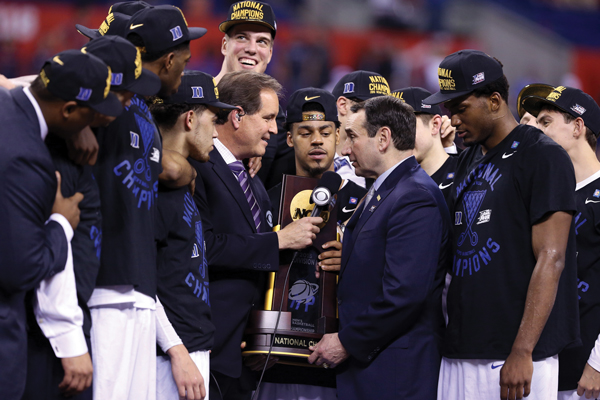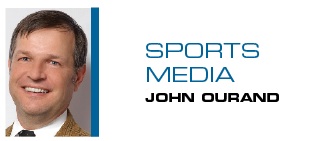 |
CBS, long at the center of March Madness, sees the championship game move to Turner this year.
Photo by: GETTY IMAGES
|
For media reporters, one of the most reliable stories over the past two decades has been allowing local broadcast affiliates to bemoan the migration of sports to cable. With the NCAA men’s basketball championship game moving to cable for the first time, it seemed like a good time to dust off the Rolodex and call some of those angry affiliates.
“Well, I wouldn’t say angry,” said
Raycom Media senior vice president
Pat LaPlatney, who will succeed
Paul McTear as president and CEO of the country’s largest privately owned broadcast company in July. “I’d say disappointed.”
This is a story that’s as old as the cable industry — and one that generates lots of ink every time a big sports event moves from broadcast to cable TV. Affiliates complain that the move is not fan friendly and point to the fact that CBS reaches 116.4 million homes while TBS, which carries tonight’s championship game, is in 93.8 million homes. Even with its Team Stream plan, which will show the game on TBS, TNT and truTV, tonight’s viewership number should be down this year.
LaPlatney said Raycom, which owns 12 CBS affiliates, hasn’t heard many customer complaints about the situation. With such strong regular-season games on channels such as ESPN and FS1, college basketball fans need a cable subscription to follow the sport.
“To some degree, the consumer is getting used to the migration of sports to cable,” LaPlatney said. “There are a number of examples out there where if you take a game, it’s going to get a greater audience on a broadcast network. It reaches homes that cable can’t. I’m sure that frustrates some viewers.”
The truth is that broadcast executives and CBS’s station affiliates never liked this 14-year, $10.8 billion deal that CBS and Turner signed in 2010. Soon after the deal was announced, TVNewsCheck Editor
Harry Jessell penned a column calling it “bad for broadcasters.” A year later, in 2011, the broadcast industry’s trade magazine Broadcasting & Cable referred to the deal as “March Sadness.”
Those complaints resurfaced this year, as the tournament’s three biggest games moved over to cable TV exclusively. While this marks Turner’s third consecutive year of carrying the Final Four, it’s the first time Turner will carry the championship game, to be played tonight in Houston.
Speaking on background, broadcast industry executives renewed complaints about this deal, using words like “awful” and “terrible.” The NCAA tournament is a healthy media property today — by all accounts, ad sales have been on fire. While the $770 million annual price tag on the tournament’s media rights doesn’t necessarily look like a bargain, it no longer seems like an outrageous deal. That has caused some broadcasters to wonder whether CBS even needed to partner with Turner.
I called Ben Grossman to see whether he thought these local broadcast complaints had any validity. A former editor of Broadcasting & Cable magazine, Grossman now runs a media consulting business working with major TV networks, sports properties and tech companies.
Grossman has heard these complaints before and does not have a lot of time for them. He recalled that CBS would have lost the entire tournament to ESPN if it had not partnered with Turner in 2010. At the time, the fact that CBS was able to keep a big part of the tournament on broadcast was no small feat.
“CBS cares about the broadcast business more than anybody,” Grossman said. “Decisions on sports properties are not made in a vacuum. If I’m an affiliate, I’d put my trust in Les Moonves.”
In Grossman’s view, the Turner partnership kept the NCAA tournament on CBS and allowed it to save enough money to keep the NFL on Sunday afternoons, launch “Thursday Night Football” and produce a high-quality golf schedule — all affiliate-friendly, broadcast-centric deals.
“If you’re worried about nine hours of programming out of a full year, you’ve got bigger issues at hand,” he said. “It’s part of running an affiliate station. They will more than make up for it this fall when Donald Trump spends a lot money leading up to the November election.”
Still, CBS affiliates executives are disappointed that they are losing a premier sports event that the network has carried exclusively since 1982. LaPlatney, who was one of the few to go on record, expressed disappointment that his stations lost out on the local ad sales revenue for an event that reliably brings in one of TV’s biggest audiences. Last year, a whopping 28.3 million viewers tuned into CBS for the Duke-Wisconsin final.
LaPlatney also was disappointed to miss the opportunity to promote his stations’ programming lineup during the big games.
“It’s a tough year for CBS affiliates,” LaPlatney said. “The NCAA tournament is a cultural event now in this country. Ratings are great in every market because March Madness captures the attention of the viewing public like very few other events.”
John Ourand can be reached at jourand@sportsbusinessjournal.com. Follow him on Twitter @Ourand_SBJ.





